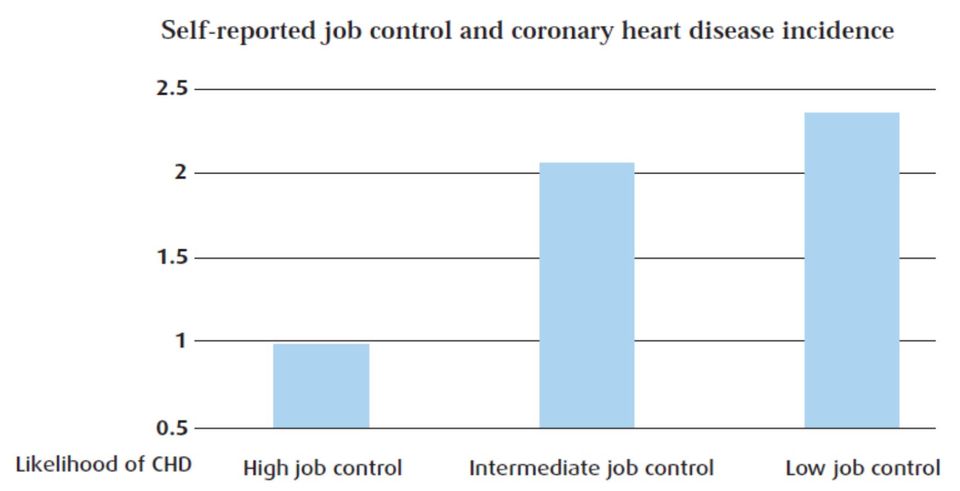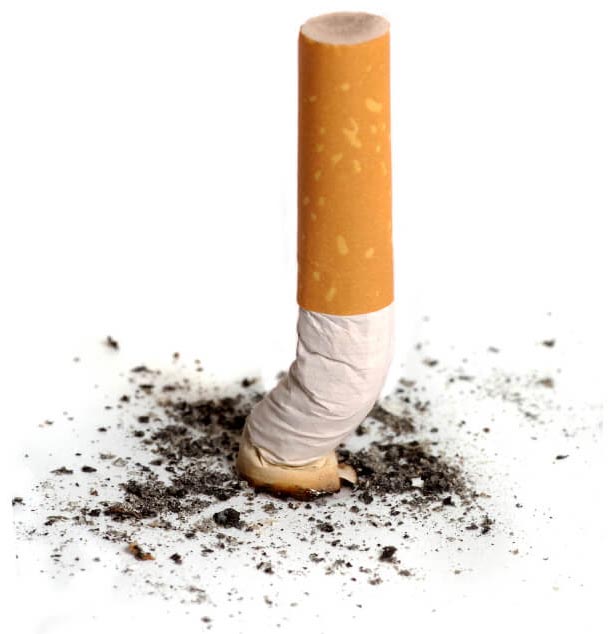Stress and Illness
| Introduction
|
Stressed From the Inside |
Stressed-Out Society |
Stress Upon Stress |
The Way Forward
^ Introduction
It's already a mainstream view that illnesses like anxiety and addiction go hand in hand with stress, yet increasingly we're seeing evidence of how much physical health is also related to stress.

These studies looked at two workplace stressors, and showed how these went hand in hand with an increased risk of illnesses as serious as coronary heart disease (see the graph above), some cancers, back pain and depression. Theses were unfair treatment at work, and lack of control over one’s job.
^ Stressed From the Inside
Studies such as the one above bring home the potentially fatal nature of stress. Yet of course stress comes not only from the outside, in things like stressful jobs. It's not always possible to control our outer circumstances. As an alternative we take ownership of ourmind - the one domain we can truly own.
The quick solution to a stressful relationship, for example, is to stop our participation in relationship dysfunction - not least by addressing the fear
and anger
in our head that keep us intimidated (fear) or furious (anger).
When we find ourselves "beside ourselves with rage", we might at the time feel strong. The truth behind this illusion, however, is that anger makes us power-less witnesses to our own destructiveness and self-destruction.

One study showed that being stressed out of our mind by anger - and made to see only blame objects and scapegoats - was associated with a 31% hike in coronary heart disease risk. The same study found that those who stayed calm and constructive even in the thick of heated disputes actually enjoyed a lowering of their risk of coronary heart disease.
^ Stressed-Out Society
While anger and fear are already well established as causes of stress, desire is not. Yet can't desire escalate to the point of greed, compulsion and addiction? A very good case can be made for another "stress force" just as destructive as fear
and anger, even if one that pulls us in a different direction: compulsive desire.
The compulsion to possess power and status drives us to perch higher and higher above our neighbour, and take an ever greater share of the spoils. And all of this despite the resulting devastation to the community - as exposed by the Whitehall Studies (see above).
By this means, extreme division stressed out the human tribe - and all courtesy of compulsive desire, a "stress force" that lords it over us (if unconsciously) just as
fear and
anger do.
Despite all the hype, here, the direction of travel is towards not greater "civilisation" but poverty of humanity.
Our very expression "pecking order" picks out how chicken-like we can become when taking up our slot in the hierarchy. Baboons, meanwhile, have been observed to be consummate opportunists at grabbing status - regardless of the consequence to others. Specifically,
"alpha male" baboons "rule the roost" and serve as "top dog", but only through stamping his authority through displays of aggression and through fighting off any challenger.
Here's the connection with stress: stress hormone (cortisol) measurements in baboons show that the lower their status, the greater baboon's stress. Just for good measure, low-status, "loser" baboons at the bottom of the hierarchy are dealt a continual stream of bites and other humiliations by their "superiors".

If "alpha male" status is a kind of superficial trophy we can be stressed into fighting over, then part of why we covet it is that we're made to see it as literally essential to our happiness.
This is because the "stress force" that drives our interest - compulsive desire
- makes us see money and status through "rose-tinted spectacles". It's compulsive desire
that drives our insatiable quest for fashion brands, sports cars, millionaire yachts etc., all the while that we're distracted from such real
treasures as love, joy and imagination.
Those left behind in the race to "get ahead" - a share likely to keep growing - are left to share the fate of low-status baboons, whose brain and hormone changes bear an uncanny resemblance to those of depressed humans.
Again, this fits with link between low status and depression observed in the Whitehall studies.
^ Stress Upon Stress
That stress can operate on multiple levels is highlighted also in the Copenhagen City Heart Study. This showed that high levels of stress can make a healthy lifestyle harder to attain - by making us less likely to succeed with measures like quitting a smoking habit, limiting our alcohol intake, or staying physically active.

This is yet another example of how some huge public health concern can only be effectively addressed by tackling our stress.
^ The Way Forward
For our health to be truly championed - at the level of both the individual and the community - we need more effective means of containing our stress.
One possible approach is outlined in this website - and in the accompanying book.
In a nutshell, the work described is that of taking back the initiative through knowledge and awareness of fear
and its fellow "stress forces" - starting with their presence within our own self.
Click here for more
Find out about the "Four Steps To Freedom from Stress"
[Nb this website is not a replacement for professional help where needed.]
